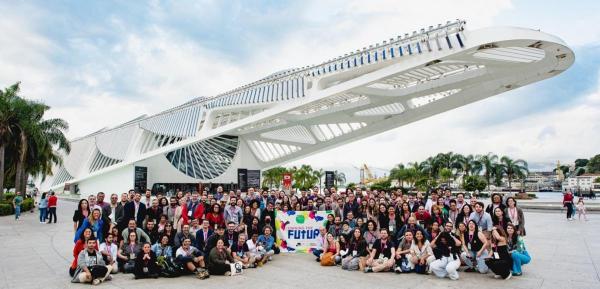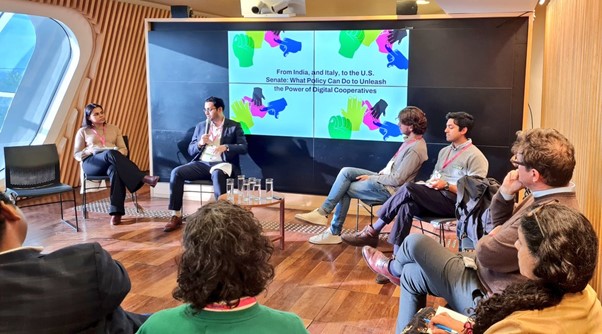
Over the course of three days, from 4-6 November 2022, the 7th Platform Cooperativism Consortium conference “Owning the Future: Sustainably Scaling Platform Cooperatives with the Global South” was held in the Museum of the Future in Rio De Janeiro, Brazil. Mr. Mohit Dave from ICA-AP was among the 150 attendees who participated in the conference. The central theme of the conference was - Scaling: how do we do it (especially in the Global South), how do we measure it, and how do we account for the value that platform coops generate?
The Platform Cooperativism Consortium, or PCC, is a group of researchers and activists from all over the world trying to build a more democratic, fair, and decentralized digital economy for workers and communities. Research of the Institute for the Cooperative Digital Economy (ICDE) adds to the body of knowledge that promotes democratic entrepreneurship in the platform economy. The local organiser, Institute for Technology & Society (ITS) works to ensure that Brazil and the Global South respond creatively and appropriately to the opportunities provided by technology in the digital age and that the potential benefits are broadly shared across society.
The conference was supported by several stakeholders, including but not limited to Organização das Cooperativas Brasileiras (OCB) - the entity that represents cooperativism in Brazil; Sistema OCB/RJ which develops and strengthens the cooperative movement in Rio; Mondragon University, which is a private, non-profit, cooperative university in the Basque country; Coopersytem, the largest technology cooperative in Brazil; and NeedsMap, a cooperative platform that connects those in need with those who can assist.
Prof. Trebor Scholz, Founding Director of the ICDE and the PCC, stressed upon why it was time to move the conference south to re-energize and be re-energized by the growing platform cooperative movement after prior conferences in cities like Berlin and New York City. As Latin America is seeing political shifts in Chile, Colombia, and more recently in Brazil, there has never been a better time to bring together cooperators, entrepreneurs, researchers, policymakers, technologists, unions and social movement organizers.
One of the key highlights of the conference was the presentation by Mr. Rafael Zanatta, the executive director of Data Privacy Brasil Research Association, a civil society organization focused on data protection and fundamental rights based in São Paulo. He has released a comprehensive report on the Brazilian platform cooperativism in the fellowship program for the ICDE. The paper, available in English and Portuguese outlined the state of platform coops in Brazil and conducted a thorough analysis of all the relevant parties. The conference actualized what Mr. Zanatta had begun on paper. To provide legal expertise for the solidarity economy, social firms, and collectives, Rafael Zanatta discussed legal clinics, the necessity for a knowledge ecosystem, more players, free/open software, management and business skills. When it comes to public policy innovation, Rafael highlights the value of collaboration between institutionalized and non-institutionalized sectors. He said that this is not just a possibility; it is the way things will go.

Mr. Mohit Dave made a presentation on his ongoing ICDE research fellowship. He discussed how policy initiatives can strengthen the platform cooperative movement in India and mapped the stakeholders in the ecosystem, couching them in socio-political realities while analysing whether (and how) platform coops could contribute to India’s growing platform economy. The President of the International Cooperative Alliance, Mr. Ariel Guarco, closed the event with his pre-recorded video address.
The Conference reaffirmed that there is no one solution to the problems with the capitalist platform economy. But we do have a chance to change the status quo and create a platform economy that is more equitable by utilizing a variety of worker initiatives and multi-stakeholder models of collective ownership. The event embodied a holistic perspective by including samba and poetry jam sessions, an unconference where participants decided what to discuss, policy roundtables, tech workshops among participants, and nuanced academic presentations. The broad backgrounds of the conference attendees, both ideologically and in terms of sectors, who represented cooperatives, unions, IT entrepreneurs, municipalities, and social movements, served as an example of this. During the three days at the Museum of the Future, the participants shared experiences, connected with several stakeholders, learned about practices from diverse contexts, engaged in discussion, and ultimately energized the building of a platform economy alternative that is scalable and sustainable.



